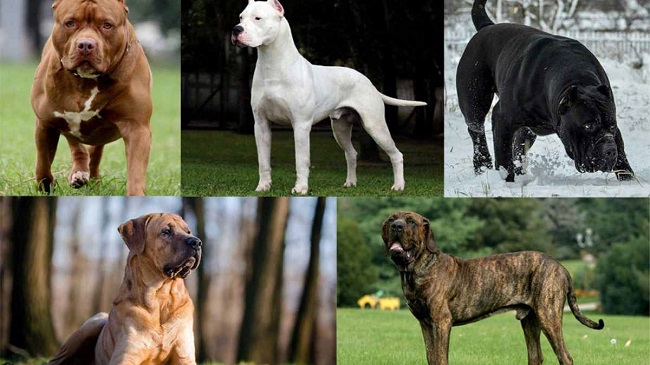Certain dog breeds have garnered a reputation for being ‘aggressive’ due to widely held misconceptions and biased media portrayal. However, labeling an entire breed as aggressive oversimplifies the reality.
Aggression in dogs, like any other behavior, is a complex interplay of genetic predisposition, upbringing, socialization, training, and individual temperament.
This article aims to provide an unbiased examination of these so-called ‘aggressive’ breeds, shedding light on their true characteristics and care needs.

Understanding Aggression in Dogs
Aggression is a natural behavior in dogs, often stemming from fear, territorial instincts, or a lack of socialization. However, it’s essential to understand that any dog, regardless of breed, can exhibit aggressive behavior under certain circumstances.
Read Also:
It is our responsibility as pet owners to ensure our dogs are properly trained and socialized to mitigate such behaviors.
Pit Bull Terrier
Pit Bull Terriers, often labeled as aggressive, are in fact, some of the most loving, loyal, and courageous dogs when properly trained and socialized.
They are powerful and athletic dogs that require ample exercise and mental stimulation. They respond well to positive reinforcement training methods.
Rottweiler
Rottweilers are robust, protective dogs. When trained and socialized from a young age, they can be great family pets. Known for their loyalty and intelligence, Rottweilers need consistent leadership and a job to do to channel their energy positively.
Doberman Pinscher
Doberman Pinschers are protective and alert, making them excellent guard dogs. They are intelligent, fast learners, and require regular exercise. With proper socialization and training, they can be friendly, loyal companions.
German Shepherd
German Shepherds are often utilized in police and military roles due to their intelligence and trainability.
They are protective and need adequate exercise, mental stimulation, and early socialization. When properly trained, they can be excellent family pets.
Akita
Akitas are a powerful breed, known for their loyalty and aloofness towards strangers. Originating from Japan, they were originally bred for hunting.
Akitas are not typically aggressive but can be reserved and protective, which may be misinterpreted as aggression. Proper socialization and consistent training are essential to raise a well-behaved Akita.
Boxer
Boxers are energetic and playful dogs. Though they are not aggressive by nature, their size and strength can be intimidating.
Boxers require ample exercise to prevent boredom and potential destructive behavior. Early socialization and obedience training are crucial in raising a well-adjusted Boxer.
Caring for ‘Aggressive’ Breeds: Training and Socialization
Training and socialization are key to ensuring any dog grows into a well-adjusted adult. Early, positive experiences with various people, animals, and environments can significantly reduce the likelihood of aggressive behavior.
Consistent, reward-based training methods are most effective and help foster a strong, positive relationship between the dog and the owner.
Health Considerations
Certain breeds are prone to specific health issues that can influence their behavior. For example, hip dysplasia, common in German Shepherds and Rottweilers, can cause discomfort and lead to irritability. Regular vet check-ups can help detect and manage health issues early.
The Role of Breed-Specific Legislation
Breed-specific legislation (BSL) is a law or ordinance that bans or restricts certain types of dogs based on their appearance, usually targeting breeds that are perceived as ‘dangerous’ or ‘aggressive.’
However, these laws are often questioned due to their effectiveness and ethics. Many experts believe that legislation should focus on responsible pet ownership and behavior-based laws, rather than targeting specific breeds.
A Responsible Approach to Ownership
Owning any dog breed requires responsibility. It’s essential to research and understand the needs of the breed you’re considering.
This is even more important when considering breeds that are powerful or have a reputation for aggression. Owners must be prepared to invest time in training, socializing, and adequately caring for their pet.
Read Also:
Conclusion
The label of ‘aggressive’ dog breeds often does more harm than good, perpetuating stereotypes and leading to misunderstandings about these breeds. With proper care, training, and socialization, these breeds can make wonderful pets.
It’s crucial to remember that every dog deserves a chance to prove that aggression is not a breed trait, but a behavior that can be managed and often prevented.
























